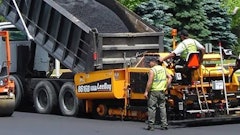At the risk of entering treacherous waters here, it's important to note that starting today there is probably a slight warming taking place among those banks and companies who lend us money. That's because, setting aside the politics of it (because even though politics is involved it's really an economic issue), the package the House approved today was something that had to happen.
Like it or not, the U.S. economy (and the world economy for that matter) operates on credit -- on loans and interest and payments. Many (most? all?) contractors couldn't survive without credit, and most homeowners couldn't either. But the series of foul ups -- you can blame whomever you like, there's plenty to go around -- had created a credit freeze, where lenders were not only picky (as they always should have been) about who they lend money to, they refused to lend money, even to each other. Ask any contractor who recently tried to get a loan how difficult that was going to be. And there's a "trickle-up" problem with a credit freeze, too: If contractors can't get loans to buy equipment, manufacturers can't sell (to say nothing of the fact that manufactures then can't get loans to buy raw materials). That's just an example in the construction industry but it's repeated throughout the economy. It's a whirlpool effect that could suck a whole lot of folks down.
In the very short term a credit freeze is uncomfortable; in the long term a credit freeze untenable. Time will tell if this was the best package to pass or the best route to take, but clearly something had to be done and this plan is, if nothing else, a start.
Latest




















